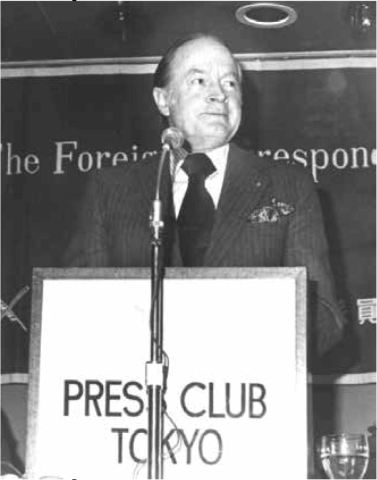Issue:

World famous comedian Bob Hope spoke to a full house at a Club professional luncheon on Dec. 17, 1972. On the way to his last performance for U.S. troops in Vietnam his ninth consecutive Christmas appearance there he took time to answer questions from Tokyo correspondents. At least one query, no doubt, would have been in regard to his support of President Nixon’s bombing of North Vietnam to force acceptance of U.S. peace terms, for which his usual response was to cite his responsibility to lift the troops’ spirits. Hope and then FCCJ President Mack Chrysler (U.S. News & World Report) can also be seen in a photo on the wall of the Club’s entrance.
BOB HOPE WAS BORN Leslie Townes Hope in England in 1903 and emigrated with his family to the U.S. at the tender age of five. He was a busker and a boxer before becoming a comedian and dancer, actor, singer and eventually an author (and golfer). After an early career in vaudeville and on Broadway, he gravitated to radio in 1934 and switched to television in the 1950s. His film career spanned more than 50 productions, including The Paleface, one of my favorites, and the series of “Road” films with Bing Crosby and Dorothy Lamour. He hosted the Academy Awards 14 times from 1941 to 1978.
He is remembered by millions in the U.S. for his many USO tours for military personnel, and a 1997 act of the U.S. Congress signed by President Bill Clinton named Hope an “Honorary Veteran.
” From the Vietnam and later wars he was faulted for supporting the government in these conflicts, but from an overall perspective his underlying support appears to have been more for those serving in the military.
He died on July 27, 2003 at the age of 100. His signature song, “Thanks for the Memory,” which he first sang together with Shirley Ross in a film in 1938 and then used to close his many shows, is still remembered with nostalgia by his fans.
— Charles Pomeroy

